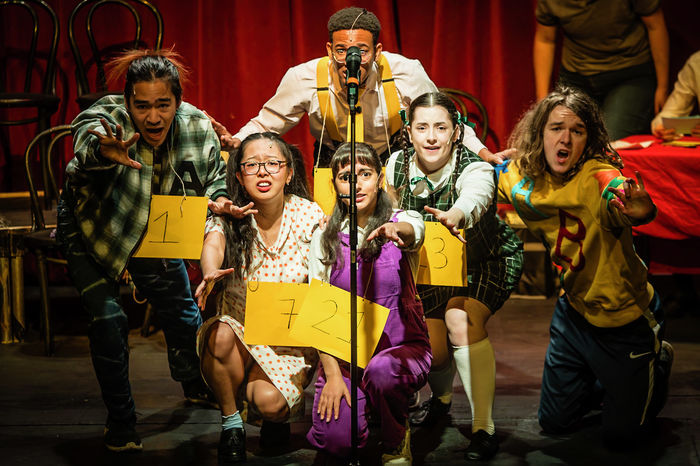My Fair Lady is an enchanting evening
The majestic setting and strong performances are sublime in this rags-to-riches tale

There is always an added level of magic when the performance of a musical involves a visible live orchestra. Mix that with the majesty of the Gonville and Caius Hall, and you have the truly delightful night of musical fun that was the Gonville and Caius Music Society’s production of My Fair Lady.
As the audience ascended the stairs to the hall we were greeted by the ensemble in their quirky Covent Garden costumes; the grandeur of the atmosphere was augmented by the audience, who also dressed up for the delectable performance. The ensemble as a whole were extremely impressive, immediately transforming the formal hall into a busy market with their hubbub, bursting in through several doors on all sides. Throughout the show they were a strong presence, particularly in the servant’s chorus, which became the perfect interjection for the ‘montage’ of Professor Higgins training Eliza, as well as encapsulating the comedically snooty tone of the scene at the Ascot races wonderfully.
“The ensemble was extremely impressive, immediately transforming the formal hall into a busy market”
The vocal performances in the show were almost faultless. The very minor drawback of the live orchestra being so close to the audience and actors combined with the expansiveness of the space was that, near the start of the show, some voices were drowned out when singing, but this was very quickly fixed. Tabitha Tucker shone in full effect as Eliza Doolittle in her song ‘Wouldn’t It Be Lovely’. The performance was charming and beautiful, and her retention of the cockney accent throughout the singing was impressive. A standout vocal performance for me was Harry Gant as Freddy in ‘On the Street Where You Live’, as his voice was rich and booming, reminiscent of a classic Hollywood romantic tone.
Directors Emily Callow and Hugo Williamson were ambitious with their use of space, as the nature of the hall meant that the lighting was almost entirely natural, save for two sets of light on either side of the orchestra, which were cleverly utilised to wash them in purple lighting during the Embassy Ball, evoking an air of royalty. As the sun set during the interval, the lighting for the second half felt more moody, and lent itself well to the more emotionally-charged scenes. Although the set was sparse, the ensemble were expertly employed to bring in and out a sofa and a gramophone to signify the inside and outside of Professor Higgins’ house. In these interludes, the orchestra ensured that the audience were perpetually entertained. As the hall is not a theatre, the seats were not tiered, so inevitably audience members seated on rows further back lost some of the more intricate action, especially scenes performed sat down on the sofa. However, very often the choreography allowed the characters to cover the whole of the stage, including the diagonals in between the sides of the audience.
“Tabitha Tucker shone in full effect as Eliza Doolittle in her song ‘Wouldn’t It Be Lovely’”
For a feel-good musical such as this, you would want the ambience to be joyful, and I am glad to say that the show was genuinely funny, with the audience chuckling along to all of the expected moments of humour. An unexpected hilarious dynamic was between Colonel Hugh Pickering (Harry Elliot) and Mrs Higgins (Doraly Gill). Their comic timing and intonation in their conversation at the Ascot Races was fantastic, and this chemistry continued into the Embassy Ball scene, with a certain sassiness in the portrayal of Mrs Higgins being a big hit with the audience. Orlando Oliver also embodied the hilarity of his character as Alfred P. Doolittle, and his physical characterisation skill really came to the forefront in ‘With a Little Bit of Luck’.
The ending of the show was poignant and sweet, and the audience erupted into applause, especially for the orchestra, led by musical director Louis Pettitt, who accompanied the actors with such skill for the entire show. I couldn’t help but feel uplifted at the end of the show, humming ‘I Could Have Danced All Night’ to myself as I walked out of the college. In all honesty, the sense of pure enjoyment brought about by the show meant I could have watched all night.
 News / Cambridge academics stand out in King’s 2026 Honours List2 January 2026
News / Cambridge academics stand out in King’s 2026 Honours List2 January 2026 Interviews / You don’t need to peak at Cambridge, says Robin Harding31 December 2025
Interviews / You don’t need to peak at Cambridge, says Robin Harding31 December 2025 Comment / What happened to men at Cambridge?31 December 2025
Comment / What happened to men at Cambridge?31 December 2025 News / Varsity’s biggest stories of 202531 December 2025
News / Varsity’s biggest stories of 202531 December 2025 Features / “It’s a momentary expression of rage”: reforming democracy from Cambridge4 January 2026
Features / “It’s a momentary expression of rage”: reforming democracy from Cambridge4 January 2026










